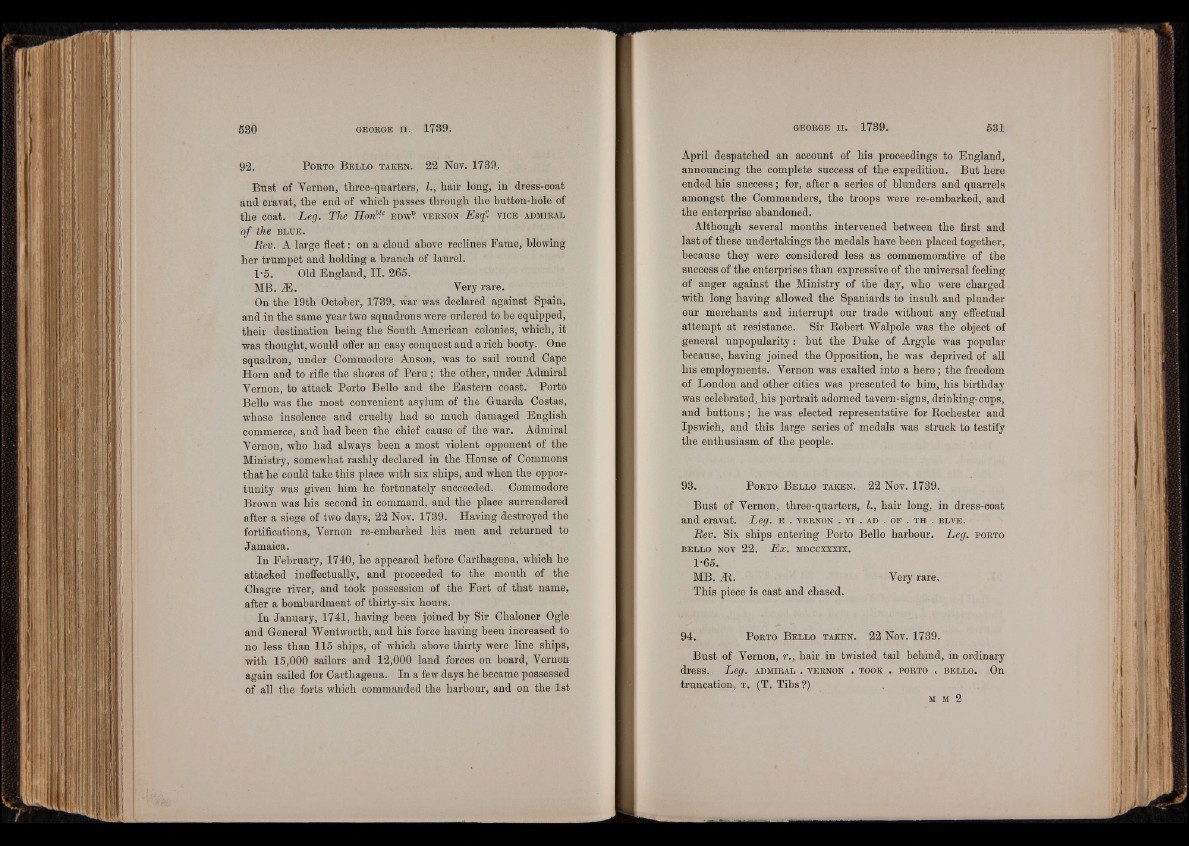
92. P o r t o B e l l o t a k e n . 22 Nov. 1739,
Bust of Vernon, three-quarters, I., hair long, in dress-coat
and cravat, the end of which passes through the button-hole of
the coat. Leg. The Honb-e e d w ? v e r n o n Esqr- v i c e a d m i r a l
o f the BLUE.
Rev. A large fleet: on a cloud above reclines Fame, blowing
her trumpet and holding a branch of laurel.
P5. Old England, II. 265.
MB. JE. Very rare.
On the 19th October, 1739, war was declared against Spain,
and in the same year two squadrons were ordered to be equipped,
their destination being the South American colonies, which, it
was thought, would offer an easy conquest and a rich booty. One
squadron, under Commodore Anson, was to sail round Cape
Horn and to rifle the shores of Pern; the other, under Admiral
Vernon, to attack Porto Bello and the Eastern coast. Porto
Bello was the most convenient asylum of the Guarda Costas,
whose insolence and cruelty had so much damaged English
commerce, and had been the chief cause of the war. Admiral
Vernon, who had always been a most violent opponent of the
Ministry, somewhat rashly declared in the House of Commons
that he could take this place with six ships, and when the opportunity
was given him he fortunately succeeded. Commodore
Brown was his second in command, and the place surrendered
after a siege of two days, 22 Nov. 1739. Having destroyed the
fortifications, Vernon re-embarked his men and returned to
Jamaica.
In February, 1740, he appeared before Carthagena, which he
attacked ineffectually, and proceeded to the mouth of the
Chagre river, and took possession of the Fort of that name,
after a bombardment of thirty-six hours.
In January, 1741, having been joined by Sir Chaloner Ogle
and General Wentworth, and his force having been increased to
no less than 115 ships, of which above thirty were line ships,
with 15,000 sailors and 12,000 land forces on board, Vernon
again sailed for Carthagena. In a few days he became possessed
of all the forts which commanded the harbour, and on the 1st
April despatched an account of his proceedings to England,
announcing the complete success of the expedition. But here
ended his success ; for, after a series of blunders and quarrels
amongst the Commanders, the troops were re-embarked, and
the enterprise abandoned.
Although several months intervened between the first and
last of these undertakings the medals have been placed together,
because they were considered less as commemorative of the
success of the enterprises than expressive of the universal feeling
of anger against the Ministry of the day, who were charged
■With long having allowed the Spaniards to insult and plunder
our merchants and interrupt our trade without any effectual
attempt at resistance. Sir Robert Walpole was the object of
general unpopularity : but the Duke of Argyle was popular
because, having joined the Opposition, he was deprived of all
his employments. Vernon was exalted into a hero ; the freedom
of London and other cities was presented to him, his birthday
was celebrated, his portrait adorned tavern-signs, drinking-cups,
and buttons ; he was elected representative for Rochester and
Ipswich, and this large series of medals was struck to testify
the enthusiasm of the people.
98. P o r t o B e l l o t a k e n . 22 Nov. 1739.
Bust of Vernon, three-quarters, I., hair long, in dress-coat
and cravat. Leg. e . v e r n o n . v i . a d . o f . t h . b l v e .
Rev. Six ships entering Porto Bello harbour. Leg. p o r t o
BELLO NOV 22. Ex. MDCCXXXIX.
1-65.
MB. Æ. | Very rare.
This piece is cast and chased.
94. P o r t o B e l l o t a k e n . 22 Nov. 1739.
Bust of Vernon, r., hair in twisted tail behind, in ordinary
dress. Leg. a d m ir a l . v e r n o n . t o o k . p o r t o . b e l l o . On
truncation, t . (T. Tibs ?)
m m 2